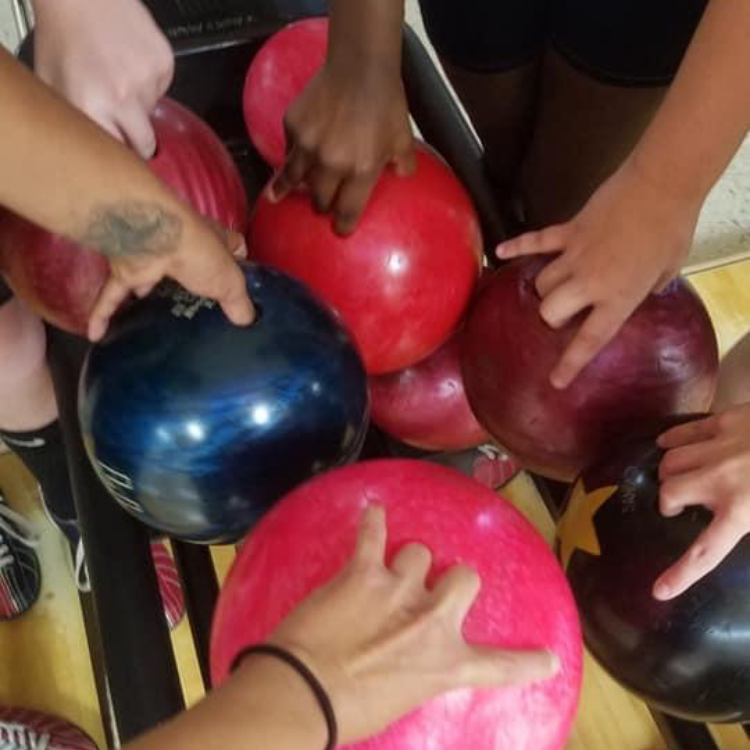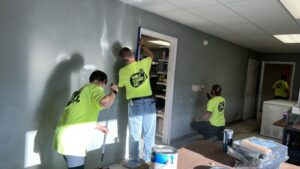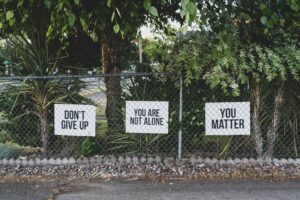“A pandemic reduces the number of at-need children we can serve.”
Essential and non-essential businesses are not the only places to be hard hit by COVID-19. Local non-profit agencies have struggled too, especially Youth Services of Creek County. How YSCC has chosen to cope with the pandemic is a boon to the organization, and is a result of excellent leadership and staffing, and the resilience of the youths themselves.
Executive Director Erin Brook has been with YSCC for almost 20 years. (She took a break in 2007 to work in hospice and returned in 2008 to take her current position.) As the daughter of an undertaker and a teacher, she says she always knew she would eventually earn a master’s degree so she could work with adolescents or geriatrics in need.

When she found a job at YSCC fresh out of college to work with at-risk kids in the hometown she treasures, she felt it was the perfect “opportunity to serve the community.” The certainty came to her: “I can help those kids.” Her goal is to listen and validate their feelings so that they “can become the best [kids] they can be.”
YSCC heals traumatized youth ages 4 to 17 (and their families) through counseling, crisis intervention, education, early problem prevention, coaching, and support. Last year, they reached 240 kids through school-based outreach services, answered 1,500 calls on their 24-hour crisis hotline, took 89 at-risk youths to camp, educated 50 parents through community outreach programs, and coached 49 families to buildSSX more positive relationships and decision-making skills through their First Time Offender Program.

Perhaps most importantly, they provide emergency shelter for children who have been removed from their homes by the Court, the Office of Juvenile Affairs, or the Department of Human Services. Last year, they sheltered 140 kids, 31 of whom were under the age of 10. At the agency the children are provided essential needs and are enrolled in Sapulpa Public Schools. They participate in counseling, life-skills groups, recreational activities, and other programs.
Then, the Coronavirus hit Oklahoma and changed the ways to reach at-risk children and protect them. When it started right before Spring Break, they continued to work in the schools, which is where recognition of needy youths happens. They serve nine school districts–Sapulpa, Kiefer, Pretty Water, Bristow, Kellyville, Depew, Drumright, Oilton, and Mannford. They do group therapy for life skills and individual face-to-face therapy in the office. They tried teletherapy sessions but found that patients struggled to stay focused and that some families were uncomfortable with this technology.
Having no time to prepare for alternate methods of therapy, the agency struggled to reach kids in need, who would typically have been referred to them by teachers, other school staff, daycare workers, or the parents themselves. Brook lamented, “If we’re not out in the community (and we weren’t during this time) we aren’t able to get those referrals. When kids are not visible to those who usually report abuse,” their issues often go unreported.
Though some families have experienced upsides to isolation, like enjoying dinners together and much more quality time together, the scary side of being home for some kids is that no one can monitor abuse and neglect. So, domestic abuse and child abuse have risen and referrals to YSCC are down roughly 60 percent on their hotline.
During the first half of the COVID-19 isolation, the kids did really well. There were a multitude of activities to occupy them (video games, movies, arts and crafts, and more), and, of course, they went outside. Sunshine is an underappreciated factor for most of us, and the simple act of walking around one’s neighborhood can be cathartic.
During the second half of the shutdown, however, with added stress factors and isolation, emotions took a downturn, creating fear and anxiety in children. Typically extroverted, outgoing, happy kids began to feel alone and withdrawn. Having no interaction with peers and no standard routines like going to school, seeing friends, and socializing, had noticeably negative effects.
Although this was true for most kids, it was markedly tougher for the YSCC kids, who faced five weeks with very little interaction from their peers. YSCC was down to one resident at one point. This lone kid was, in his words, “bored out of his mind.” He occupied himself by playing basketball, walking around the block, playing video game marathons, and trying to appreciate the one-on-one attention from the few staff members at work.
Regarding quarantine, four of Brook’s staff were forced to stay home from the beginning, which drastically reduced the number of families they could serve. Despite the many obstacles they have faced in the last few months, YSCC says help is always available.
As of June 1st, they are providing face-to-face therapy. Employees go through a rigorous process to ensure their good health and will work from home if exposed to the virus. There are now three (usually five) children residents there, so things are beginning to feel more normal.
For more information on YSCC and its services, please visit their website at www.yscc.net. If you are in crisis you can also call their 24/7 crisis line at 918-227-2622.
Their annual League the Way bowling fundraiser event was scheduled for Friday, July 17th, but is changing to a virtual event. More information on that change is coming shortly.







